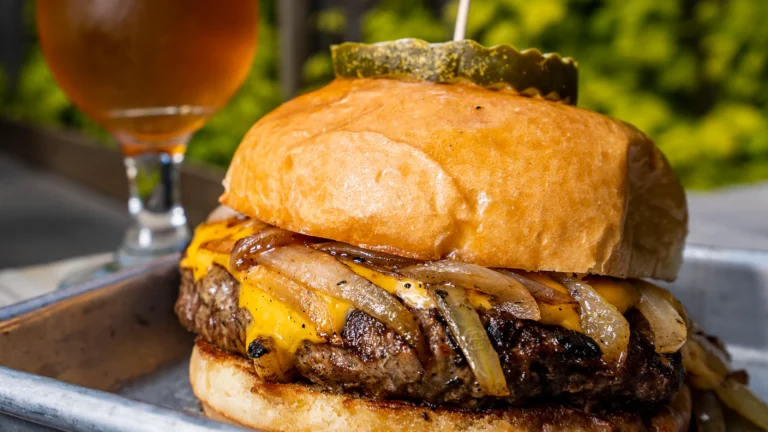Is Burger King Healthier Than McDonald’s?
Fast food giants like McDonald’s and Burger King have been competing for decades—not just in taste and price, but also in nutrition. So the burning question remains: Is Burger King healthier than McDonald’s? Or to flip it: Which is healthier, McDonald’s or Burger King? This article dives deep into both menus, comparing key nutrition facts, healthier options, and overall ingredient quality to help you make informed choices.

Calories, Fat & Sodium: A Nutritional Face-Off
Let’s start with the numbers—how do similar items from Burger King and McDonald’s stack up?
Classic Burgers
- Burger King Whopper: Around 660 calories, 40g of fat, and 980mg of sodium.
- McDonald’s Big Mac: Around 550–580 calories, 30g of fat, and roughly 1,000mg of sodium.
On this front, the Big Mac is slightly lower in calories and fat, while sodium levels are fairly similar.
Double Cheeseburgers
- Burger King Double Cheeseburger: Approximately 370 calories, 18g of fat, 720mg of sodium.
- McDonald’s Double Cheeseburger: Roughly 440 calories, 23g of fat, 1,050mg of sodium.
Burger King’s version is clearly lighter in both calories and sodium.
Chicken Nuggets (4-piece)
- Burger King: About 170 calories and 310mg of sodium.
- McDonald’s: Closer to 190 calories and 360mg of sodium.
Again, Burger King slightly edges ahead with a lighter profile.
Verdict: Burger King often wins when it comes to calorie and sodium count in similar menu items. However, the differences aren’t drastic enough to call it a runaway win.
Healthier Options: Variety Beyond Burgers
Beyond the classics, both chains offer some better-for-you options.
Grilled & Lean Proteins
- Burger King features items like grilled chicken sandwiches and limited salads.
- McDonald’s offers options like egg white breakfast sandwiches, oatmeal, and grilled chicken salads.
McDonald’s generally has a wider selection of lighter meals and sides.
Vegetarian & Plant-Based Choices
- Burger King leads with the Impossible Whopper—a fully plant-based burger that mimics the real thing.
- McDonald’s offers fewer vegetarian mains, though you can sometimes find plant-based wraps or sides depending on the region.
Verdict: Burger King excels in plant-based meals, but McDonald’s provides broader everyday healthy alternatives.
Ingredient Quality: What’s Actually Inside?
When it comes to health, it’s not just about numbers—it’s about ingredients.
Cleaner Labels
Both companies have made strides toward cleaner eating:
- Burger King removed artificial flavors, colors, and preservatives from most of its signature items, including the Whopper.
- McDonald’s has taken similar steps, removing high-fructose corn syrup from buns and cutting preservatives from chicken nuggets and burgers.
Meat and Produce
Both chains source beef and chicken in ways that meet industry standards. However, neither is particularly known for organic or free-range practices.
Verdict: It’s a tie here—both have made improvements, but neither stands out significantly in ingredient sourcing.
Side-by-Side: Key Comparisons
Here’s a quick snapshot of how some popular menu items stack up:
| Item | Burger King | McDonald’s | Healthier Pick |
|---|---|---|---|
| Signature Burger | 660 cal / 40g fat | 550 cal / 30g fat | McDonald’s |
| Double Cheeseburger | 370 cal / 18g fat | 440 cal / 23g fat | Burger King |
| Chicken Nuggets (4-piece) | 170 cal / 310mg Na | 190 cal / 360mg Na | Burger King |
| Grilled Chicken Salad | ~440 cal / 25g fat | ~330 cal / 17g fat | McDonald’s |
| Breakfast Egg Sandwich | ~370 cal / 19g fat | ~300 cal / 12g fat | McDonald’s |
As shown, Burger King wins in a few head-to-head matchups, but McDonald’s offers more variety of lighter choices overall.
Is Burger King or McDonald’s Healthier?
This is the question on everyone’s mind: Is Burger King or McDonald’s healthier?
Let’s break it down:
Why Burger King May Be Healthier
- Lower calories and sodium in some menu items
- Plant-based Impossible Whopper as a signature vegetarian option
- Transparent moves toward cleaner ingredients
Why McDonald’s May Be Healthier
- Larger range of low-calorie and low-fat meals
- More options for breakfast and snacks that are health-conscious
- Oatmeal, yogurt, and salads available in many locations
Conclusion: If you’re focusing on individual items, Burger King might be a slightly healthier pick—especially when comparing options that often appear on lists of the Top 10 fast food burgers. If you want overall meal flexibility and a healthier variety of choices, McDonald’s could be the better choice.
Tips to Eat Smarter at Either Chain
Want to eat healthier no matter where you go? Try these simple hacks:
- Choose grilled over fried—cut the fat and calories.
- Skip or reduce sauces—they add sugar and sodium fast.
- Watch your portions—small fries over large, single burgers over doubles.
- Opt for water or milk—skip soda and sugary drinks.
- Mix and match—a burger with a side salad can be a smarter combo than a burger and fries.
As the saying goes, “you can’t have your cake and eat it too,” but with fast food, you can often have your burger and still make it a healthier choice. Tools like the Burger King Nutrition Calculator can help you customize your meal and track calories, fat, and sodium before you order.
Final Verdict
So, which is healthier—McDonald’s or Burger King?
There’s no one-size-fits-all answer. It depends on what you order:
- Burger King shines when comparing basic burgers and nuggets.
- McDonald’s wins for variety and overall healthy menu options.
- Both are improving ingredients and transparency.
Ultimately, you hold the power to make healthier choices at either restaurant.
Quick Takeaway
- Burger King: Lower in calories and sodium for some items, great for plant-based eaters.
- McDonald’s: Better variety of lighter meals and snacks, slightly cleaner breakfast options.
- Your choice matters more than the chain—go grilled, downsize, and be mindful of add-ons.
Make the smart pick next time you’re at the drive-thru window. Your body will thank you for it.







